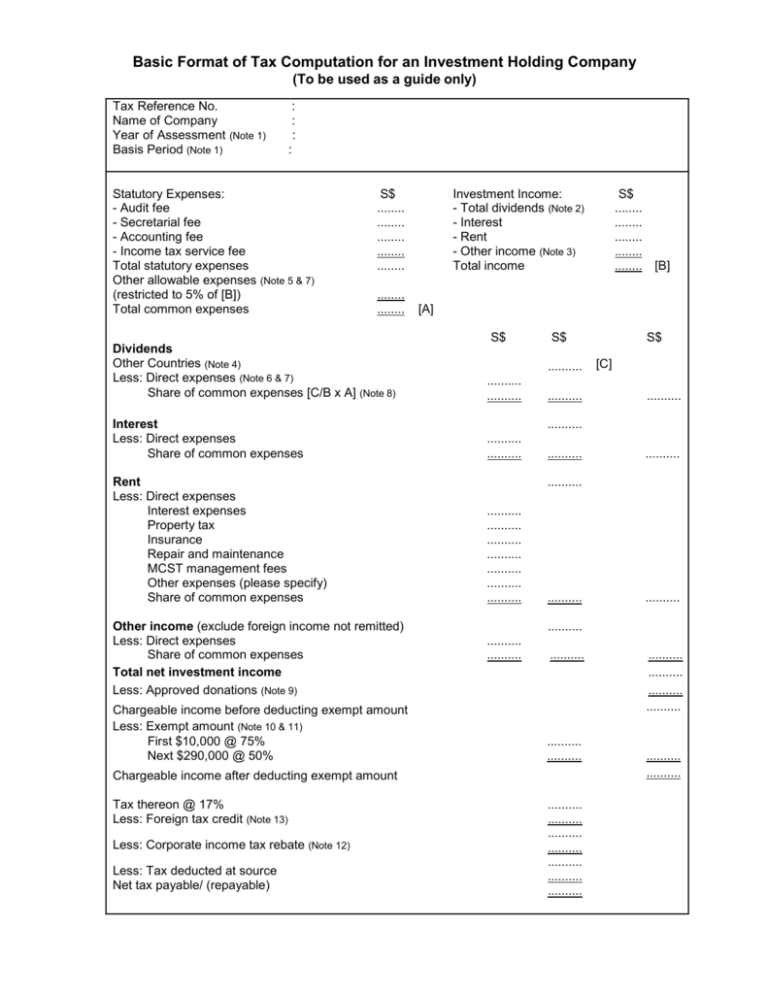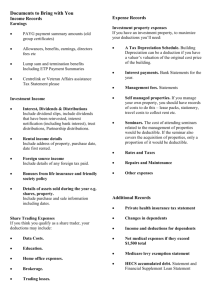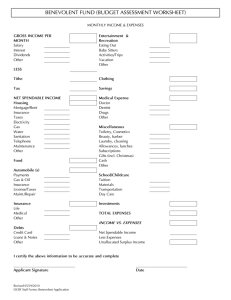Basic Format of Tax Computation for an Investment Holding Company
advertisement

Basic Format of Tax Computation for an Investment Holding Company (To be used as a guide only) Tax Reference No. Name of Company Year of Assessment (Note 1) Basis Period (Note 1) : : : : Statutory Expenses: - Audit fee - Secretarial fee - Accounting fee - Income tax service fee Total statutory expenses Other allowable expenses (Note 5 & 7) (restricted to 5% of [B]) Total common expenses S$ ........ ........ ........ ........ ........ ........ ........ Investment Income: - Total dividends (Note 2) - Interest - Rent - Other income (Note 3) Total income [A] S$ Dividends Other Countries (Note 4) Less: Direct expenses (Note 6 & 7) Share of common expenses [C/B x A] (Note 8) .......... .......... Interest Less: Direct expenses Share of common expenses .......... .......... Rent Less: Direct expenses Interest expenses Property tax Insurance Repair and maintenance MCST management fees Other expenses (please specify) Share of common expenses Other income (exclude foreign income not remitted) Less: Direct expenses Share of common expenses Total net investment income Less: Approved donations (Note 9) Chargeable income before deducting exempt amount Less: Exempt amount (Note 10 & 11) First $10,000 @ 75% Next $290,000 @ 50% S$ .......... .......... Less: Corporate income tax rebate (Note 12) Less: Tax deducted at source Net tax payable/ (repayable) S$ [C] .......... .......... .......... .......... .......... .......... .......... .......... .......... .......... .......... .......... .......... .......... .......... .......... .......... .......... .......... .......... Chargeable income after deducting exempt amount Tax thereon @ 17% Less: Foreign tax credit (Note 13) S$ ........ ........ ........ ........ ........ [B] .......... .......... .......... .......... .......... .......... .......... .......... .......... .......... .......... .......... .......... EXPLANATORY NOTES Companies which have been incorporated with the object of holding investments and deriving investment income are advised to prepare the tax computation in the manner shown. 1. Year of Assessment and Basis Period Income is assessed to tax on a preceding year basis. The basis period for a Year of Assessment (YA) is the financial year ending in the year preceding that YA. The examples below illustrate the concept of YA and basis period: a) If your financial year end is 31 Mar of each year, the basis period for YA 2015 is 1 Apr 2013 to 31 Mar 2014. b) If your financial year end is 31 Dec of each year, the basis period for YA 2015 is 1 Jan 2014 to 31 Dec 2014. 2. Total Dividends The amount to be entered is the total dividends, including Singapore exempt dividends, foreign dividends not remitted to Singapore and foreign dividends that qualify for tax exemption. For details on tax exemption for foreign-sourced dividends, please refer to our e-Tax Guide “Tax Exemption for Foreign-Sourced Income” dated 31 May 2013. 3. Other Income These may include royalties and other foreign-sourced income not remitted to Singapore. 4. Dividends from Other Countries Enter the taxable amount only. Do not include foreign dividends not remitted to Singapore and foreign dividends that qualify for tax exemption. 5. Other Allowable Expenses These include directors’ fees, salaries, CPF, office rental, office water and light, general expenses, administrative expenses and fund management expenses. 6. Direct Expenses These are expenses directly incurred to earn the income. Only amount(s) attributable to income-producing investments are allowed. 7. Supporting Schedules Attach supporting schedules showing your basis of arriving at the other allowable expenses (Note 5) and direct expenses (Note 6). 8. Share of Common Expenses The common expenses are to be apportioned in the following manner: Investment Income x Total Common Expenses Total Income E.g. Share of common expenses attributable to foreign dividend income: Foreign Dividends [C] x Total Common Expenses [A] Total Income [B] EXPLANATORY NOTES 9. Approved Donations For donations made to approved Institutions of a Public Character (IPCs) and other approved recipients, 2.5 times the amount of donations made will be given as a deduction. Subject to the shareholding test, unutilised donations can be carried forward to offset against income of the company for subsequent years, up to a maximum of 5 years. For example, if the company has balance of unutilised donations from YA 2009 as at the end of YA 2014, these should be disregarded and not carried forward to YA 2015. For more information, please refer to www.iras.gov.sg (Businesses > Companies > Working out Corporate Income Taxes > Business Expenses > Tax Treatment of Business Expenses > Donations). 10. Partial Tax Exemption Partial tax exemption is given on chargeable income (excluding Singapore franked dividends) of up to $300,000 as follows: First $10,000 @ 75% Next $290,000 @ 50% For more information, please refer to www.iras.gov.sg (Businesses > Companies > Learning the basics of Corporate Income Tax > Corporate Tax Rates, Corporate Income Tax Rebates, Tax Exemption Schemes and SME Cash Grant). 11. Tax Exemption for New Start-up Companies Newly incorporated companies which qualify for tax exemption for new start-up companies, can claim tax exemption on chargeable income (excluding Singapore franked dividends) of up to $300,000 as follows: First $100,000 @ 100% Next $200,000 @ 50% Please note that investment holding companies incorporated after 25 Feb 2013 are not eligible to claim the tax exemption for new start-up companies. The company will still enjoy the partial tax exemption. For more information, please refer to www.iras.gov.sg (Businesses > Companies > Learning the basics of Corporate Income Tax > Corporate Tax Rates, Corporate Income Tax Rebates, Tax Exemption Schemes and SME Cash Grant). 12. Corporate Income Tax (CIT) rebate For YAs 2013 to 2015, all companies will receive a 30% CIT rebate that is subject to a cap of $30,000 per YA. For more information, please refer to www.iras.gov.sg (Businesses > Companies > Learning the basics of Corporate Income Tax > Corporate Tax Rates, Corporate Income Tax Rebates, Tax Exemption Schemes and SME Cash Grant). 13. Foreign Tax Credit (FTC) Amount allowable is the lower of the Singapore tax payable on the net foreign income or the foreign tax paid. Under the FTC pooling system, the amount of FTC allowable is to be restricted to the lower of total Singapore tax payable on the foreign income under pooling and the pooled foreign taxes paid on those income. FTC is not applicable for foreign-sourced dividends that are treated as exempt income in Singapore (Note 4). For more information, please refer to www.iras.gov.sg (Businesses > Companies > Working out Corporate Income Taxes > Claiming Reliefs > Foreign Tax Credit). More information on preparing tax computation for an investment holding company is available on www.iras.gov.sg (Businesses > Companies > Working out Corporate Income Taxes > Specific Industries > Investment Holding Companies).





